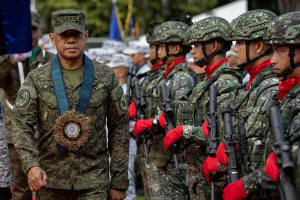|
Several government agencies, including the lower house of
Congress, have recently reported cyber attacks and the chief of
the armed forces said some of the almost daily attacks on the
military came from abroad.
"Instead of recruiting soldiers for infantry battalions, this
time we will recruit cyber warriors," General Romeo Brawner told
reporters.
"There is this general realization that this new breed of
warriors does not have to be muscle strong."
"We have experienced this almost every day," Brawner said, of
the attacks, though adding none had been successful.
"We believe some of the attacks are foreign."
Brawner did not say from where he believed the attacks were
coming from but tension with China has been high in recent
months, largely over disputed territory in the South China Sea.
The Philippines has complained about what it calls aggressive
Chinese action including "dangerous maneuvers" by its coastguard
and navy, especially near a disputed shoal.
China has rejected the complaints saying its vessels operate
lawfully in its waters.
Cyber defense training was part joint exercises this year with
U.S. forces, Brawner said, highlighting the growing importance
of cyber resilience in defence strategy.
Brawner also said the military would stop letting
telecommunication companies build cell towers in military camps.
Bases have been hosting installations operated by several mobile
phone firms, including China's state telecoms giant China
Telecom.
Brawner also said that as part of a modernization drive, he was
hoping to get radar equipment from Japan to boost surveillance
of territorial waters and the exclusive economic zone.
(Reporting by Karen Lema; Editing by Robert Birsel)
[© 2023 Thomson Reuters. All rights
reserved.] Copyright 2022 Reuters. All rights reserved. This material may not be published,
broadcast, rewritten or redistributed.
Thompson Reuters is solely responsible for this content.

|
|




